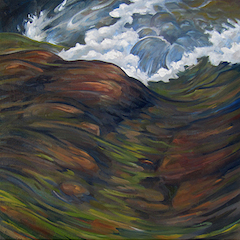Two women and a girl walk into the Sonoran Desert,
fish dangling from their hands—or are they umbrellas?
A flock of clouds sweeps by on out-stretched wings;
out of the cyclist’s path a white butterfly bursts from the rent air.
A woman—her face heart-shaped—looks into her palm, an invisible
mirror held there, as she applies dark lines across her nose, her cheeks.
Fists of rain assault the dry ground,
send up small explosions of dust around droplet craters.
Framed at the window of a wattle-and-daub shack, a woman’s face puckered
against the light—dark eyes, dark moons, under dark crescent brows.
Rivulets of juice run down fingerbone trails;
dogwood pleads after inchworm war, its naked arms upraised.
Dressed as if for marriage at sixteen, the girl is the negative of her grandmother,
dark dress, white hair, seated by the door, sunk into her chair.
In the museum I scan the glass cases, take away strings of words: cloud scrolls,
“Memory of Beautiful Women of the Green Houses,” tea dust, and iron hare’s fur glazes.
Against an adobe wall, a man disguised as Death’s Bride: white dress, ribbons in his hands
like a bouquet, human skull-faced mask, his veil held out—a gauze wing.
From pink blossom-wigs, mimosa wafts her powdered scent of woman;
the potato peels off her red tattered dress.
Beside a white painted egret, a boy poses, shark’s jaw open like a halo around his head;
his arms crossed firmly on his chest, he knows he makes a strange apparition.
Ribbed clouds: sky’s tongue strokes its upper palate;
grass’s pale spider-fingers grip pink earth.
An old woman—a lifetime of hard work—stands before a scribbled wall,
one hand on her belly, one on her breast, she touches herself with tenderness.
Boxes within boxes, Joseph Cornell’s windows on other worlds;
all exploration begun in the basement, Utopia Parkway.
A girl on exhibit, her bodice sequined, her skirt a satin fish-tail;
painted fishes, suspended by string, swim in the air around her.
Life’s waste: lashes, stamen droppings, pollen nodules, tree’s shriveled claw.
Dragon root, whorled solid river, golden furred flames, horned smoke, small green abortion.
A man in white, in a white cowboy hat, threads cautiously through a small graveyard;
the graves dusty mounds of dirt, wooden crosses with many arms, stones prop up the crosses,
a pail overturned, and all across the photo’s skin roll clouds.
Owl’s mouth: the pod grins, laughs, scatters its life-jokes.
Bark blossom, bronze skull clangs with new idea.
A woman seated at a café table, cigarette in her fingers,
her flesh barely disguises the bones of her skull.
Again and again he left them at Mermaid Avenue, went out for cigarettes,
returned months later. Now only his words are left.
A procession of women wearing women’s masks, men wearing men’s masks,
Death in his . . .
Chasing each other the birds fly in one of tree’s doors and out another;
chicory catches handfuls of sunlight in blue palms.
At a political rally, a woman strides through the street, her fringed shawl unfurled like
raven wings,
her black skirt billows like a sail, her white lace petticoat revealed beneath.
A lavender evening, early July, tops of trees turn
olive, then ochre in the animate light.
Two girls stand on the branch of a great tree—its bark the gnarled hide of a mammoth creature—
their skirts velvet, shining; their calves, feet and toes, gracile.
Night trees: a web of blood-red arms woven across the dark.
The cat, a white shadow against black grass.
Our Lady of the Iguanas, in her reptile crown, in her trillium-
painted dress; her face, her neck, her arms smooth flesh.
All day clouds pass holding hands—piled up, strung out, gauzy, billowed, cottony clouds—
and one small apricot cloud . . . trailing—an afterthought.
Two women, one with one leg, pace the dirt Pathway of the Dead to the old
pyramid of stones piled up in praise of the older mountain behind . . .
In the hush the worn wooden boxes make, we all unroll
from tattered silk casings our own repertoire of hope.
Now come all the blind portraits: Serafina, Dona Guadalupe, a gaucho—
their faces obliterated, obscured by smoke, dissolve into light.
If I could show you what Anna means, I’d bring you to the edge
of a perfect green rectangle, I would string words in the quiet air.

Kevin Maddrey, “Submerged,” oil on canvas
Half of these couplets in “Not a Ghazal” come from an exhibit entitled “Images of the Spirit” by the Mexican photographer, Graciela Iturbide, seen at the National Museum of Women in the Arts. The other half come from daily observation, including a visit to the Art Institute of Chicago. Joseph Cornell, the American surrealist, lived on Utopia Parkway in Queens, and Woody Guthrie lived on Mermaid Avenue, Brooklyn.
Reprinted from Gargoyle, Issue 48, 2004, with permission of the author.
Originally appeared in Vol. 10:1, Winter 2009, the Museum Issue.
Anne Becker is the former Poet Laureate of Takoma Park, MD. Her books include The Good Body (chapbook, Finishing Line, 2007), and The Transmutation Notebooks: Poems in the Voices of Charles and Emma Darwin (Forest Woods Media, 1996). She teaches at the Writer's Center and leads "Writing the Body," a poetry workshop for those who have experienced life-threatening or chronic illness as patient, caregiver, or family member. For over 15 years, she was senior producer of Watershed Tapes, recording major American and international poets reading their work, including Nobel Laureates Joseph Brodsky and Czesław Miłosz. To read more by this author: Five Poems, Vol. 5:2, Spring 2004.